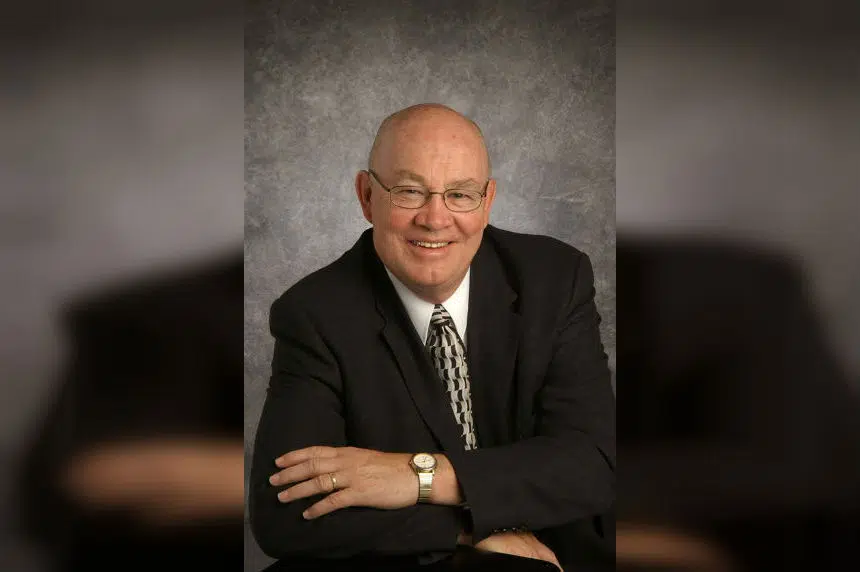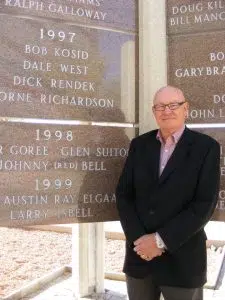Born and raised in Saskatchewan, Dale West has seen the good and the bad when it comes to the Roughriders.
West was born in Cabri before his family moved to Saskatoon. His father, Ken, had just got out of the army when the family moved — and sports played a major part in both their lives.
Football, track and speed skating were the main sports the younger West played while growing up and he had a lot of success in the latter.
“I was actually the Canadian champion by the time I was seven. I had lots of success provincially and some nationally and by 1959 I qualified as the first alternate on the Canadian Olympic team,” West said.
“Speed skating is an interesting sport because it’s all you, but I prefer team sports really. I loved baseball (and) played a lot of baseball when I was young as well, and really loved football because of the team aspect of it. It wasn’t just you, it was working well with everybody.”
West chose to focus on football after accepting a scholarship from the University of Arizona Wildcats.
“It was an eye-opener,” West said. “At home, I was a pretty good football player and sort of stood out, but down there, people with my ability basically were a dime a dozen so I really had to work hard to come up to the level that some of the Americans were at.
“We started fairly early in the morning and by 8:30 (a.m.) it was 107 degrees (Fahrenheit) and we practised for three hours. By that first morning, I think 90 per cent of us passed out from the heat. It was ridiculous but those things, you adjust to that and by the end of the year, that was nothing.”
After two years in Arizona, West decided to return to Saskatoon to play for the University of Saskatchewan.
“I really found the emphasis on football down south really difficult because they’re on you all the time,” he said. “It had actually taken the fun out of the game for me and when I came back at the U of S, the game was fun again.
“There was a level of intensity that had been dropped. It was, ‘Get out there and have some fun and play.’ ”
West turned pro in 1962 and, with no CFL draft in place at that point, the Roughriders owned his territorial rights. West can recall learning he made the team during a conversation with then-head coach Steve Owen.
“I had some difficulty making up my mind whether I wanted to come down (to Regina) or not but I did,” West said. “About 10 days into the camp, Steve took me aside and said, ‘You know, I’m used to coaching 11 guys on the field and don’t really know what to do with the 12th guy, but you’re my 12th guy.’ And that’s when I knew I made the team.”
West was mostly a wide receiver for his first season and a bit with the Roughriders before moving to safety. He was also the team’s emergency punter.
“My one claim to fame is that I had one punt — and I can’t remember what year it was, if it was ’66 or ’67 — but I had the longest punting average in the CFL that year with only one punt,” he said, referring to a 67-yarder.
West admits the team was a far cry from what it is now.
“I think the most significant thing is how the organization has come along and has become the organization that it is today,” West said. “In the past, we were always scrounging for money (and) our salaries were among the lowest in the league.
“While the fans were with us, they had to bail us out a number of times. We had all the lotteries and all different kinds of things going on. In the past 15 years, it has really, really changed.”
West caught the game-winning touchdown in a 1963 game against the Edmonton Eskimos. That was significant, as quarterback Ron Lancaster led a 109-yard drive to win the game despite the fact he still hadn’t been named the team’s starting field general.
“Ronnie and (head coach) Bob Shaw didn’t get along real well to the point Ron never went on any road trips; he was left at home for the first go up until that game basically and it was a home game. It was an interesting conflict. Bob Shaw never liked anyone who was more popular than he was,” West said.
But with Lancaster staking his claim as the starter and running back George Reed turning into a perennial all-star, the fortune of the Roughriders began to change. It all led to the 1966 Grey Cup in Toronto against the Ottawa Rough Riders.
“That was really, really exciting. I don’t think everybody realized exactly how big a game that was. We didn’t go in there thinking, ‘You know, the Riders have never won a Grey Cup; maybe we could win one.’ It wasn’t like that at all,” West said.
Saskatchewan won 29-14 to claim the franchise’s first Grey Cup title.
“We supposedly didn’t have a chance to win the game. Ottawa was the be-all and end-all at that particular time and they didn’t even have cameras for our dressing room for after the game. The cameras were over in the Ottawa dressing room because they were convinced that Ottawa would win the Grey Cup,” said West, who had an interception in the game.
“The homecoming was outstanding. We were loaded up on the bus and went to the armouries and there was thousands of people there. As a number of us have mentioned, we never had to buy a drink for a month.”
West was named a Western all-star three times in his CFL career, during which he caught 18 passes for 480 yards and six touchdowns and intercepted 17 passes for 265 yards and a TD. He was inducted into the Roughriders’ Plaza of Honour in 1997.
He retired from the Roughriders in 1968 and he spent the next 31 years as a teacher in Regina. He was also the program co-ordinator for the Saskatchewan Sports Hall of Fame and Museum.
Now, West and his wife are enjoying retirement and spending time with their nine grandchildren.












